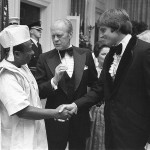This is not a new thought but it comes up every year when any number of pious bloggers recommend the benefits of reading through the entire Bible in a year. I need to be careful what I say because my dear father followed this routine, probably for the last 25 years of his life.
When I started at Patheos a year or so ago I had plans for blogging about the challenges and successes of a year-long reading plan. I soon found it artificial. Truth be told, my wife and I have regular patterns for family worship, and as an elder who serves on denominational committees I have reasons for studying the Bible on my own, not to mention meditating on a sermon and going back to look at the text preached. Well, aren’t I pious. (Here‘s someone who doesn’t think so.)
So what is it about annual Bible reading plans? Justin Taylor repeats standard piety:
The Bible commends is knowing the whole counsel of God (Acts 20:27) and meditating or storing or ruminating upon God’s self-disclosure to us in written form (Deut. 6:7; 32:46; Ps. 119:11, 15, 23, 93, 99; 143:5). It is compared to bread and water—not nice things to have when there is time but that which is essential for survival.
The point is not to check off a list or punch in your time but rather to meditate on the Word in such a way that your mind, heart, and actions are transformed in a godly, gospel-drawn way.
The problem is, a Bible-reading plan does function like a diet or exercise routine. Did I read the right number of chapters in the Old Testament? Check. Did I exceed my carbs for the day? Check. Did I reach the right cardio-vascular outputs to stay on pace for the upcoming marathon? Check.
If it were merely a habit, part of the way a believer “walked” with God, it might seem organic. But when it is an item on an already long to-do list it becomes a chore. That is why I see a certain synergy between Bible reading plans and spiritual productivity.
As you know, I recently released Do More Better: A Practical Guide to Productivity, a book on this very subject. There are, of course, a million books on productivity, but I wrote mine to address a couple of weaknesses in the genre. First, I wanted to provide a compelling and Bible-based definition of productivity that both redefines and elevates what it means to get things done. Second, I wanted to combine the theoretical with the practical, to teach both the why and the how of productivity. There is a lot of benefit in combining the best reason to be productive with the best tools and systems.
Do More Better is not just a book to read, but a book to do. 10 Days of Productivity is meant to both complement and supplement the book in this area of putting it into action and keeping it in action. Those 10 days can help get the new year off to a great start. In that time I will lead you through much of the book’s content, coaching you as you begin to focus on this new kind of productivity, as you learn to use some new tools, and as you develop some new routines.
Sorry, Tim, but I don’t think reading God’s word should feel like flossing.












